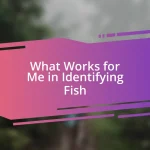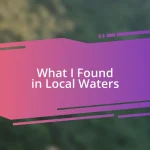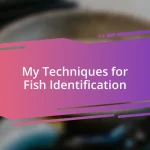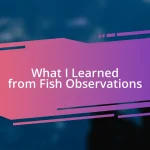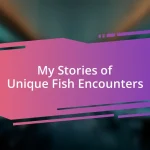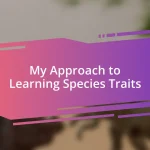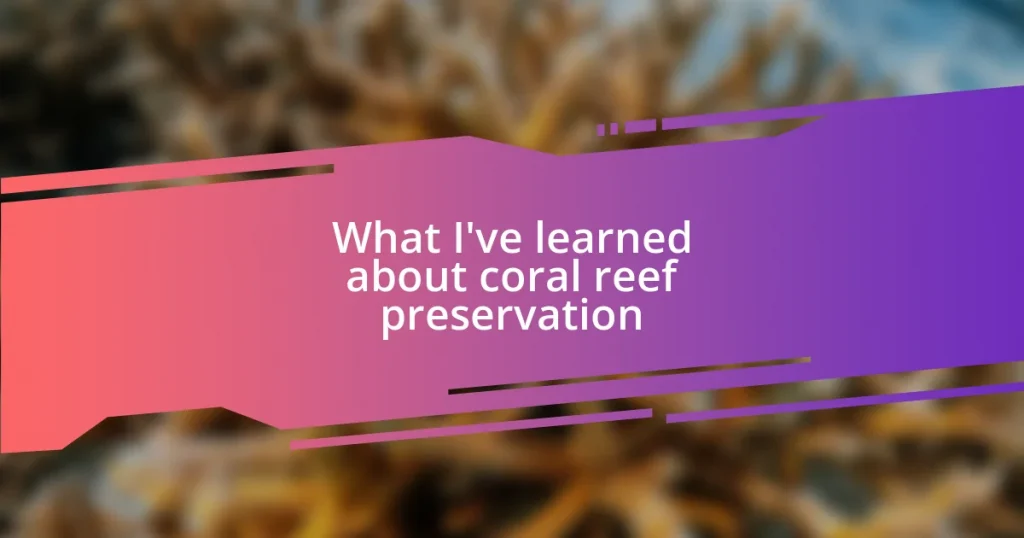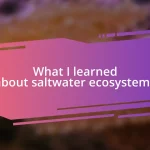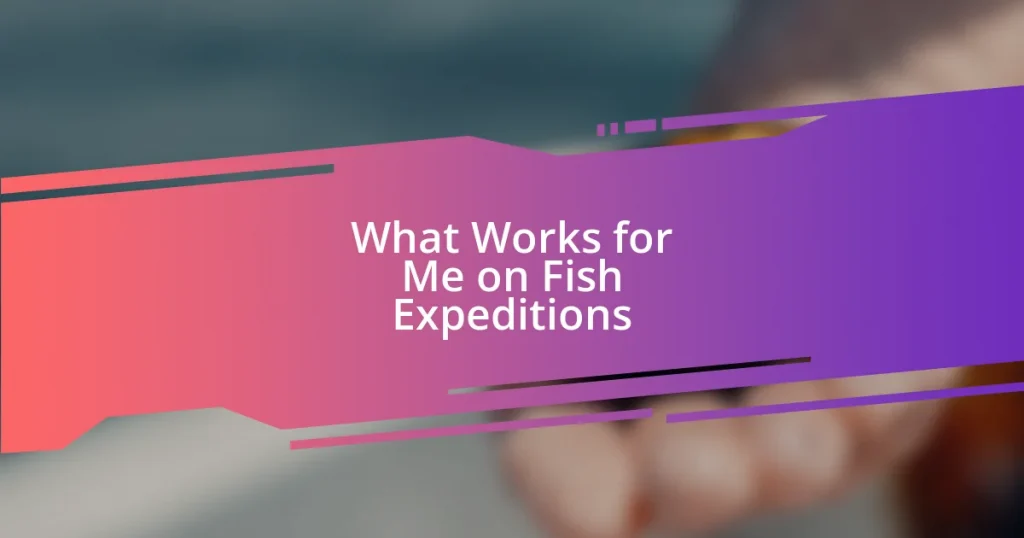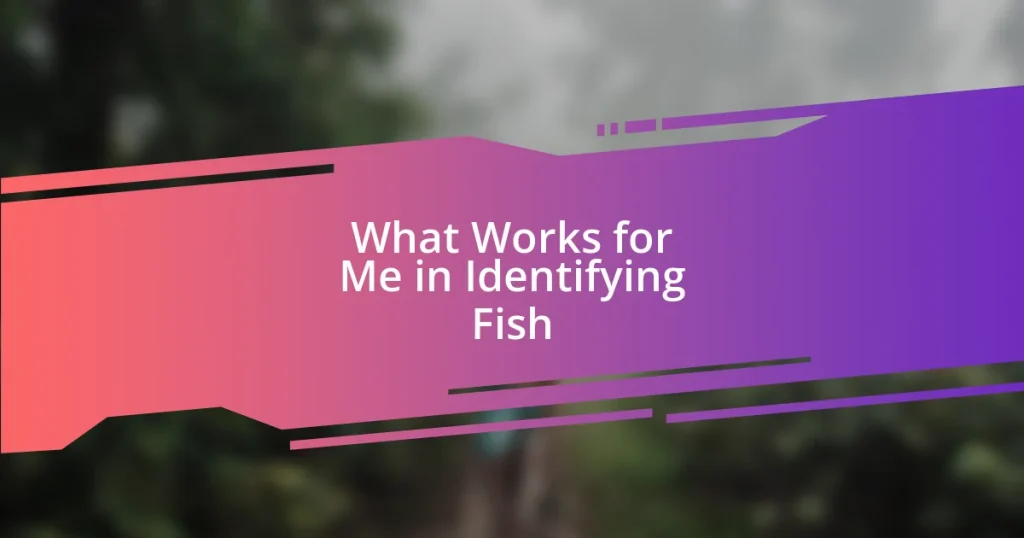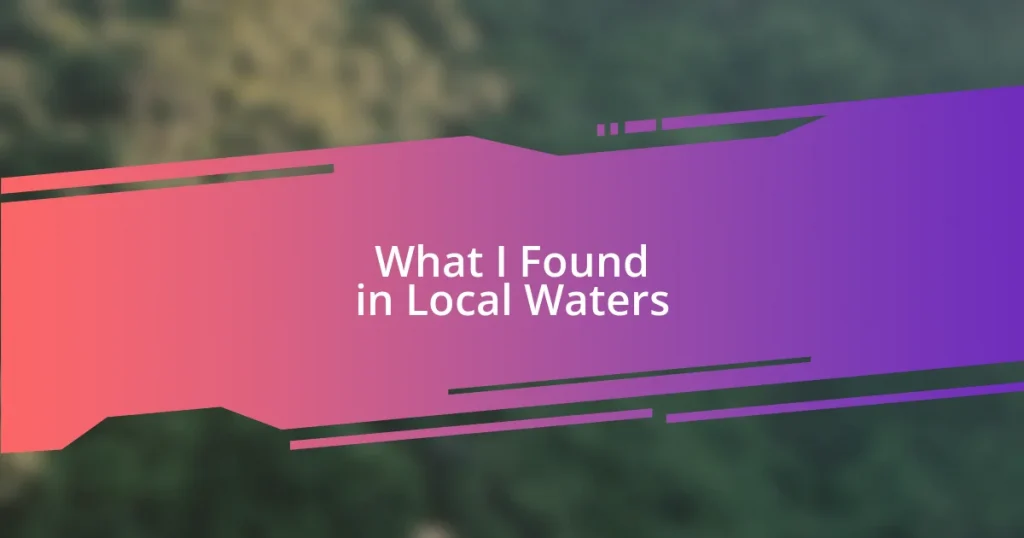Key takeaways:
- Coral reefs are crucial for marine biodiversity, supporting over 25% of marine species and providing coastal protection, livelihoods, and medical advancements.
- Climate change, ocean acidification, and overfishing are significant threats to coral reef ecosystems, leading to coral bleaching and ecosystem degradation.
- Effective preservation strategies include establishing marine protected areas, community engagement in sustainable practices, and promoting coral restoration projects.
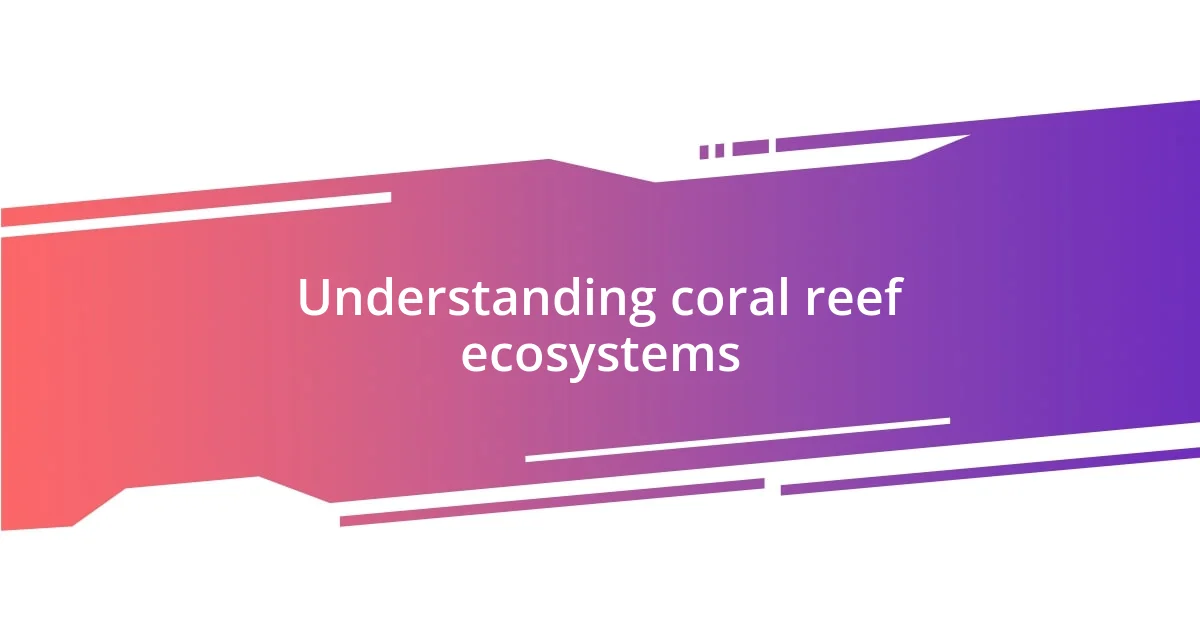
Understanding coral reef ecosystems
Coral reef ecosystems are some of the most vibrant and diverse environments on our planet, teeming with life. When I first submerged myself in the crystal-clear waters of a coral reef, I was instantly captivated by the kaleidoscope of colors and swirling fish. It’s hard to convey the awe of seeing such a complex community, where every coral, fish, and organism plays a vital role. Have you ever stopped to think about how interconnected these species truly are?
At the heart of these ecosystems are corals, which are living animals made up of tiny polyps. Each polyp forms a symbiotic relationship with algae called zooxanthellae, which not only provides the coral with food through photosynthesis but also gives it that stunning color. I remember the moment I learned about this partnership—it made me realize how integral cooperation is in nature. It begs the question, what would happen if we lost just one element of this delicate balance?
Beyond their beauty, coral reefs support countless marine species, serve as natural barriers against storm surges, and contribute significantly to coastal economies. Witnessing the effects of coral bleaching firsthand turned my fascination into a personal mission for advocacy. I couldn’t help but wonder: if we fail to protect these precious ecosystems, what legacy will we leave for future generations?
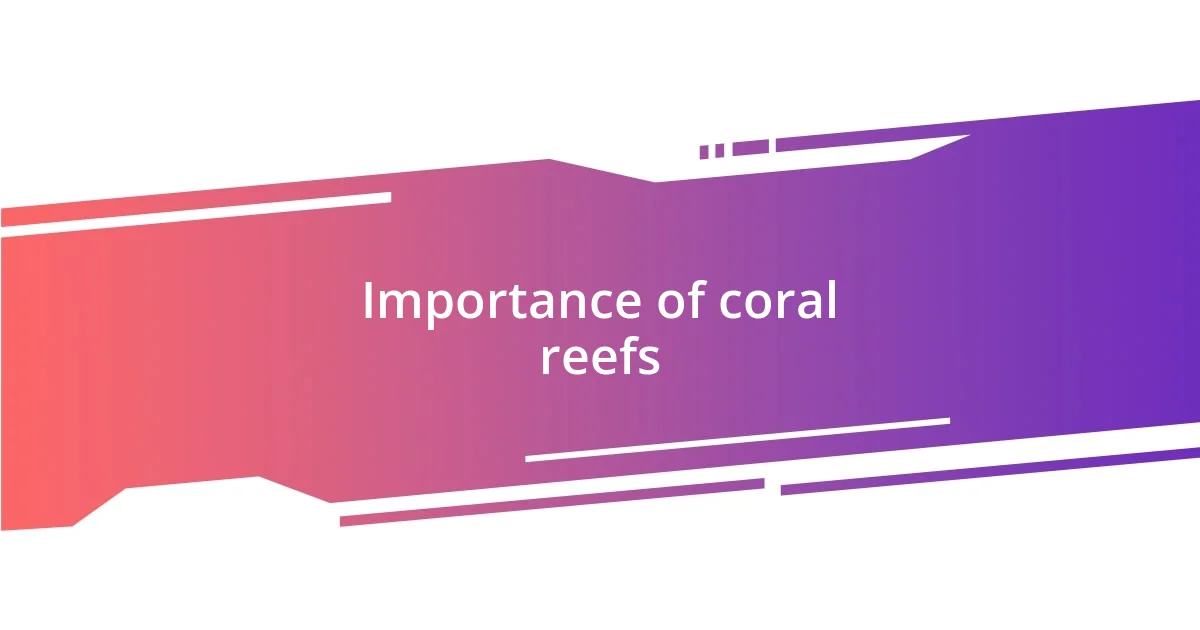
Importance of coral reefs
Coral reefs are vital not just for their breathtaking beauty but for their essential role in maintaining marine biodiversity. Each time I’ve visited these underwater gardens, I’ve marveled at how they provide habitat for over 25% of all marine species. It’s incredible to think about the complexity and biodiversity thriving within a seemingly fragile structure.
- They protect coastlines from erosion and storm damage.
- Coral reefs support fisheries, providing livelihoods for millions of people worldwide.
- They are crucial for tourism, attracting visitors who crave the beauty of marine life.
- Additionally, they contribute to medical advancements, with numerous compounds derived from reef organisms offering potential treatments.
It’s heartbreaking to think about how climate change and human activity threaten these ecosystems. Standing on a beach and gazing at the horizon, knowing that beneath the waves, life can be so diverse yet so vulnerable, strengthens my resolve to advocate for their preservation. Each visit to the reef reminds me of our responsibility; we owe it to ourselves and future generations to ensure these wonders survive.
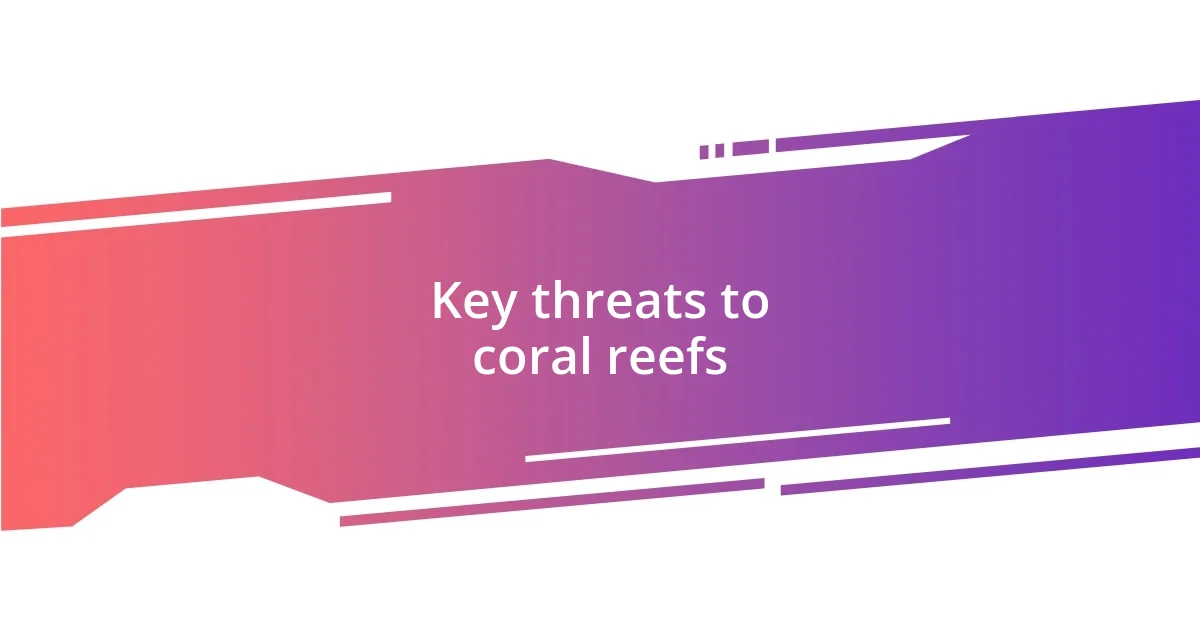
Key threats to coral reefs
Coral reefs face numerous threats, and understanding these challenges is critical. The most pressing issue is climate change, which leads to warming ocean temperatures. During a snorkeling trip last summer, I witnessed a patch of reef that had succumbed to coral bleaching. The vibrant colors faded, leaving behind ghostly white corals. It was a stark reminder of how quickly these ecosystems can be affected by global temperatures.
Another significant threat is ocean acidification, primarily caused by increased CO2 levels. I recall diving in waters that felt different over the years; surrounding coral formations were less robust and more susceptible to damage. As the ocean absorbs excess carbon, it alters the water chemistry, hindering the corals’ ability to produce their calcium carbonate skeletons. This reaction not only impacts the corals but also all the species that depend on them.
Lastly, overfishing and destructive fishing practices contribute to the degradation of coral ecosystems. I vividly remember a boat tour where we watched in horror as nets swept across the reef, capturing everything in their path. These actions disrupt the delicate balance of marine life, leading to declines in fish populations essential for maintaining healthy reefs. We must ask ourselves: how can we advocate for sustainable practices that protect these vital marine environments?
| Threat | Description |
|---|---|
| Climate Change | Rising ocean temperatures lead to coral bleaching. |
| Ocean Acidification | Increased CO2 levels reduce corals’ ability to build their skeletons. |
| Overfishing | Destructive fishing disrupts marine ecosystems supporting coral reefs. |
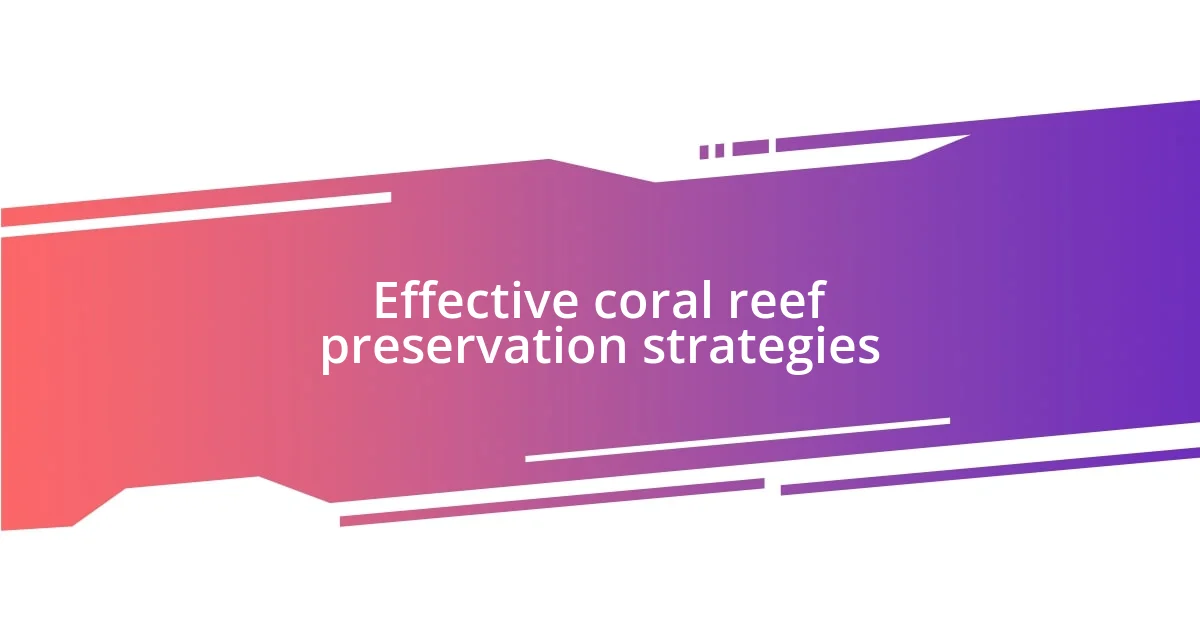
Effective coral reef preservation strategies
When it comes to effective coral reef preservation strategies, one of the most impactful approaches I’ve encountered is the establishment of marine protected areas (MPAs). During a recent snorkeling adventure, I explored a designated MPA where the difference was palpable. The corals were vibrant, fish were abundant, and it felt like a thriving ecosystem that had the space to flourish without the pressures of human activity. It’s fascinating to see how these zones can serve as sanctuaries, allowing marine life to rebound and thrive.
Another vital strategy involves community engagement in conservation efforts. I remember attending a local workshop where divers and fishermen came together to discuss sustainable practices. The passion in the room was inspiring! People shared stories about how changing their fishing methods not only helped protect the reefs but also improved their catches. It really emphasizes the idea that when communities are involved, they become the champions of their own marine resources.
Lastly, promoting coral restoration projects has gained momentum as an effective strategy. I had the privilege to volunteer with a group that was transplanting coral fragments to damaged areas. The hands-on experience was emotionally rewarding; seeing the new corals take root gave me hope. It made me reflect on how each small action can collectively lead to significant change. Have you ever considered what role you could play in supporting reef restoration? It’s a powerful reminder that every effort counts, and even individual actions can make a meaningful difference.
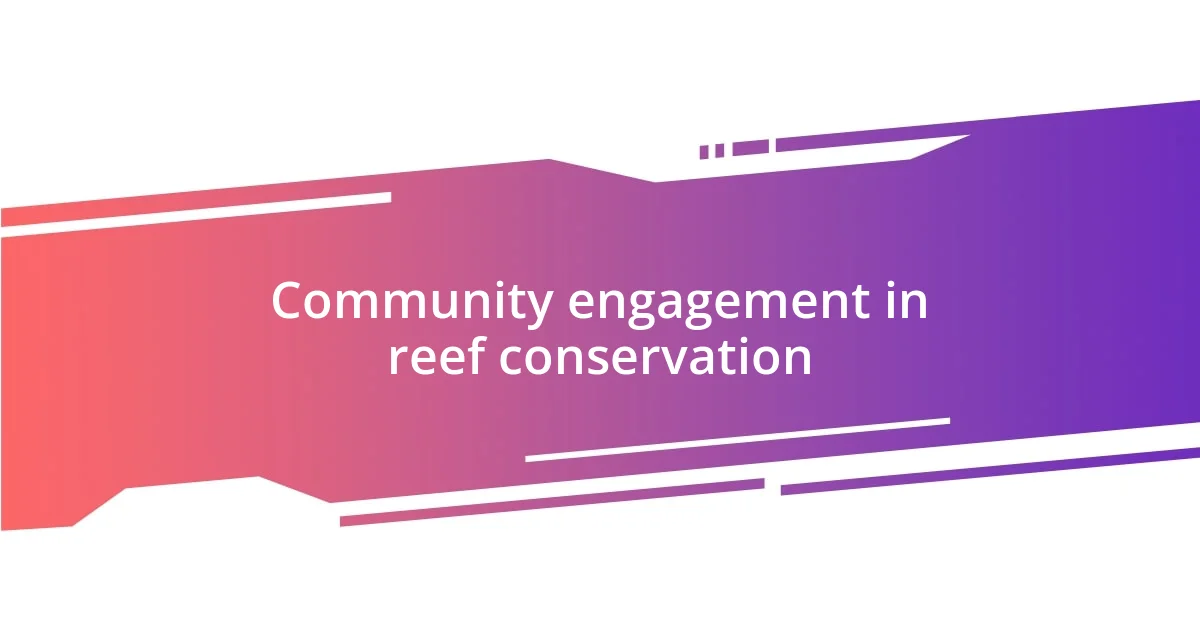
Community engagement in reef conservation
During my travels, I’ve seen firsthand how local communities can truly transform coral reef conservation efforts. For example, I remember visiting a small island community where local fishers implemented a no-catch zone. This wasn’t some top-down mandate; it came from their collective decision to restore the health of their surrounding waters. The fishermen shared stories about how their once-struggling catches rebounded, which sparked a sense of pride. Isn’t it remarkable how their commitment to conservation directly benefited their livelihoods?
I also engaged in a beach cleanup organized by a grassroots group passionate about marine health. The energy was infectious! As we collected plastic waste, we shared insights on how pollution harms coral reefs. It was evident—when people unite for a common cause, the impact is greater than the sum of its parts. I left the event feeling motivated, realizing that raising awareness and fostering stewardship within the community can significantly contribute to reef conservation.
Moreover, I recall a community meeting focusing on eco-tourism. It was fascinating to hear locals discuss how they could guide tourists in a way that respected and protected the reefs. They recognized that by involving visitors in the conservation narrative, they could generate income while preserving their natural heritage. This approach poses a question: How can we inspire more communities to see the value of their own environments? The answers lie in the power of shared experiences and a deep-rooted love for our oceans.

